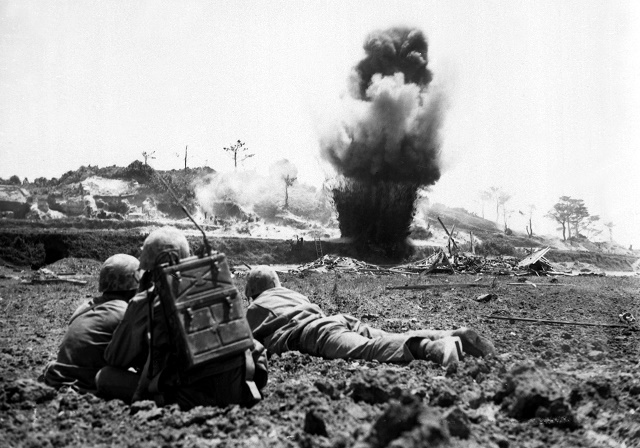Even though the war has been over for almost seventy years, WWII explosives still continue to surface around Okinawa. Japan is trying their hardest to deal with the problem by employing ordnance disposal experts to clean up the mess, but a number of bombs still remain that have yet to be located. Okinawa is not alone in their troubles, as WWII explosives continue to be found in many nations across the globe.
The worst part for Japan is not simply the presence of the bombs, but the fact that many of them are still live. Once they have been found, they have to be safely removed from populated areas so that they can be properly detonated. The Japanese Maritime Self-Defense Force has been utilizing a number of teams to deal with the WWII explosives. As of now, their ordnance disposal technicians are somewhat overwhelmed. In fact, they just recently found twenty-four bombs that had to be set off near the coast of the Kadena Air Base. Many of these are shells that were fired during the Battle of Okinawa, but simply failed to go off.
Since the bulk of the discovered ordnance is detonated in the water, the safety of passing ships is in issue. This means that once the detonation has been completed, technicians still have to investigate the area to ensure that none of the WWII explosives have failed to go off. Otherwise, there is a danger that they may go off at an inopportune time, such as when a trade ship is passing through the area, unaware of what lies beneath the surface.
As is the case in other nations such as France and Italy, a good deal of the unexploded ordnance is found at construction sites and dig sites; however, this is not always the case. In fact, a good number of the WWII explosives set off within the past months were discovered by a single diver. It is common for these bombs and shells to be discovered underwater when not found on the beach, since the Battle of Okinawa began at sea when the Allies infiltrated the coast, the Stars and Stripes reports.
Over fifteen hundred tons of WWII explosives have already been discovered around Okinawa, and there is no telling how many remain. Such armaments were heavily used during the Battle of Okinawa, so it is suspected that the remaining number may be fairly high. It is known that the United States cleaned up a fair number of WWII explosives on their own in the period immediately following the war, but it has become clear that many still remain.
//
